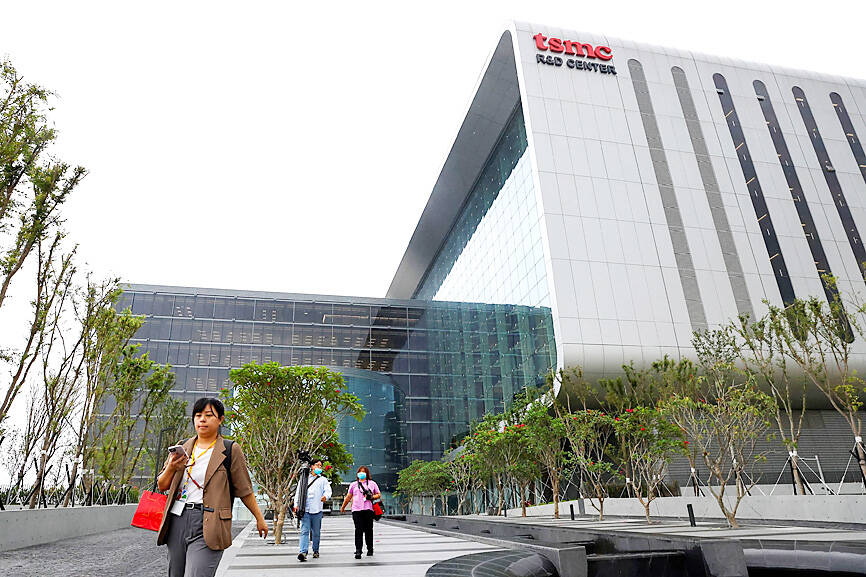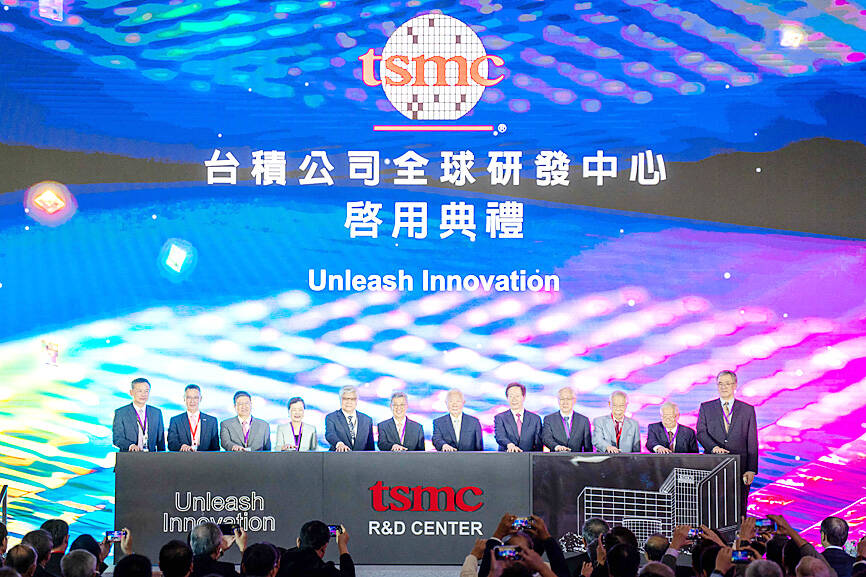Taiwan Semiconductor Manufacturing Co (TSMC, 台積電) yesterday inaugurated its new global research-and-development (R&D) center in Hsinchu to further its development of next-generation technologies, including 2-nanometer and beyond, as the world’s biggest contract chipmaker seeks to safeguard its global technology leadership.
The launch of the R&D hub demonstrates the chipmaker’s long-term commitment to investing in Taiwan and its determination to keep its roots at home, TSMC chief executive officer C.C. Wei (魏哲家) said in a speech at the inauguration.
Wei made the remarks amid concern about TSMC’s acceleration in expanding its global manufacturing footprint to the US and Japan in recent years.

Photo: Ann Wang, Reuters
The chipmaker is also considering building a fab in Germany to produce 28-nanometer chips used in vehicles in collaboration with its customers.
While TSMC’s overseas investments have sparked worries that the company might halt its development in Taiwan, Wei said that is not the case.
TSMC is expanding its overseas capacity with an aim to meet its customers’ needs, he said.

Photo: AFP / TSMC
The company expects the new R&D center to house more than 7,000 R&D engineers at full capacity by September, up from 2,200 people currently, it said.
“With the launch of the new global R&D center, TSMC will be more proactive in developing world-leading semiconductor technologies from 2-nanometer technology, 1.4-nanometer technology and smaller technologies,” TSMC chairman Mark Liu (劉德音) said.
The company said that its 2-nanometer technology would be the world’s most advanced when it is introduced in 2025, duplicating its success in bringing its 3-nanometer technology to market ahead of its competitors.
Counting Apple Inc and Nvidia Corp among its major customers, TSMC commands about a 60 percent share of the global semiconductor market.
The chipmaker said continuous investment in leading-edge technologies is the key to safeguarding its technological leadership. Last year, TSMC spent 30 percent more on R&D, totaling US$5.47 billion, compared with US$4.47 billion in 2021.
Since the company’s inception more than 30 years ago, TSMC has been determined to build its own technology, TSMC founder Morris Chang (張忠謀) said yesterday.
It was a long road for TSMC to fulfill that goal and become a global semiconductor technology leader, he said, adding that the company secured its technological leadership only after it introduced its 7-nanometer technology.
For more than 20 years, TSMC has heavily invested in R&D efforts by allocating 8 percent of its total revenue to it, Chang said.
Last year, TSMC’s R&D spending greatly surpassed the US$2 billion spent by the Massachusetts Institute of Technology, he said.

INVESTIGATION: The case is the latest instance of a DPP figure being implicated in an espionage network accused of allegedly leaking information to Chinese intelligence Democratic Progressive Party (DPP) member Ho Jen-chieh (何仁傑) was detained and held incommunicado yesterday on suspicion of spying for China during his tenure as assistant to then-minister of foreign affairs Joseph Wu (吳釗燮). The Taipei District Prosecutors’ Office said Ho was implicated during its investigation into alleged spying activities by former Presidential Office consultant Wu Shang-yu (吳尚雨). Prosecutors said there is reason to believe Ho breached the National Security Act (國家安全法) by leaking classified Ministry of Foreign Affairs information to Chinese intelligence. Following interrogation, prosecutors petitioned the Taipei District Court to detain Ho, citing concerns over potential collusion or tampering of evidence. The

Seventy percent of middle and elementary schools now conduct English classes entirely in English, the Ministry of Education said, as it encourages schools nationwide to adopt this practice Minister of Education (MOE) Cheng Ying-yao (鄭英耀) is scheduled to present a report on the government’s bilingual education policy to the Legislative Yuan’s Education and Culture Committee today. The report would outline strategies aimed at expanding access to education, reducing regional disparities and improving talent cultivation. Implementation of bilingual education policies has varied across local governments, occasionally drawing public criticism. For example, some schools have required teachers of non-English subjects to pass English proficiency

NEGOTIATIONS: The US response to the countermeasures and plans Taiwan presented has been positive, including boosting procurement and investment, the president said Taiwan is included in the first group for trade negotiations with the US, President William Lai (賴清德) said yesterday, as he seeks to shield Taiwanese exporters from a 32 percent tariff. In Washington, US Trade Representative Jamieson Greer said in an interview on Fox News on Thursday that he would speak to his Taiwanese and Israeli counterparts yesterday about tariffs after holding a long discussion with the Vietnamese earlier. US President Donald Trump on Wednesday postponed punishing levies on multiple trade partners, including Taiwan, for three months after trillions of US dollars were wiped off global markets. He has maintained a 10 percent

TRADE: The premier pledged safeguards on ‘Made in Taiwan’ labeling, anti-dumping measures and stricter export controls to strengthen its position in trade talks Products labeled “made in Taiwan” must be genuinely made in Taiwan, Premier Cho Jung-tai (卓榮泰) said yesterday, vowing to enforce strict safeguards against “origin laundering” and initiate anti-dumping investigations to prevent China dumping its products in Taiwan. Cho made the remarks in a discussion session with representatives from industries in Kaohsiung. In response to the US government’s recent announcement of “reciprocal” tariffs on its trading partners, President William Lai (賴清德) and Cho last week began a series of consultations with industry leaders nationwide to gather feedback and address concerns. Taiwanese and US officials held a videoconference on Friday evening to discuss the